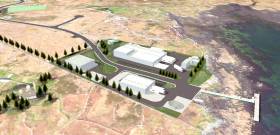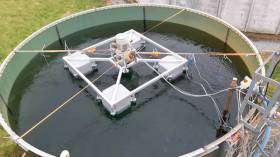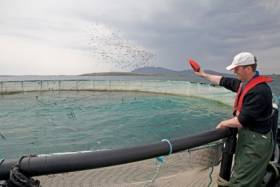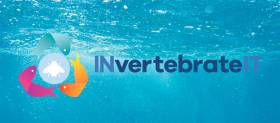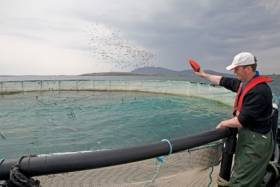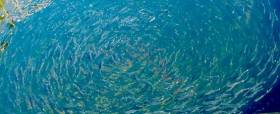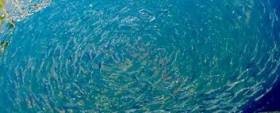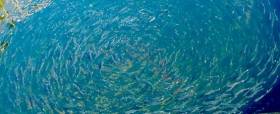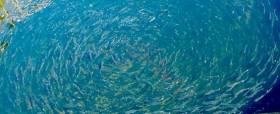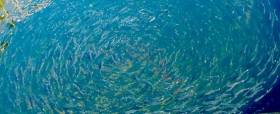Displaying items by tag: aquaculture
Council Seeks More Details On Connemara ‘Marine Innovation Park’ Proposals
#PáircNaMara - Galway County Council is seeking further details on the Páirc na Mara development for Connemara, following an objection from a local group opposed to salmon farming.
New plans for the ‘marine innovation park’ were submitted late last year by Údáras na Gaeltachta, envisaging a low-carbon marine industry hub over nine hectares, and with a focus on aquaculture research.
But as Galway Bay FM reports, an objection by Galway Bay Against Salmon Cages — which has long campaigned against aquaculture projects in the region — has “caused anger in west Connemara” where the park is slated to be developed.
The situation has now prompted the council to seek more information on the fish farming aspects of the project.
Galway Bay FM has more on the story HERE.
New Research Project To Find Improvements For Inland Aquaculture
#Aquaculture - Researchers in Galway and Athlone are leading a project to identify technologies that can improve the management of freshwater fish farming and reduce its impact on the environment.
As Green News reports, the teams at NUI Galway and Athlone Institute of Technology will look at new techniques that can reduce disease rates in inland aquaculture and the accompanying risk of transmission to fish in the wild.
Concerns over the latter were raised after a number of farmed salmon escaped into five rivers in Galway and Mayo last October.
Green News has more on the story HERE.
Connemara ‘Marine Innovation Park’ Preps New Planning Application
#MarineScience - A new planning application is set to be submitted for the proposed ‘marine innovation park’ in Connemara, as Galway Bay FM reports.
Páirc na Mara is envisaged as a low-carbon marine industry hub over nine hectares, with a focus on aquaculture research.
As previously reported on Afloat.ie, the new research cluster would form part of a network including the existing Marine Institute facilities at Newport in Co Mayo.
The deadline for expressions of interest in the revised project is tomorrow, Friday 1 December.
Galway Bay FM has more on the story HERE.
New Project Launched To Revolutionise Fish Feed For Agriculture
#Aquaculture - The INvertebrateIT Project for the aquaculture sector, in which the Marine Institute is one of five partners, has been officially launched.
The project is focused on developing innovative approaches for aquaculture, particularly on the use of organic waste for the production of insects as alternative ingredients in fish feed.
INvertebrateIT aims to help aquaculture operators mitigate their current dependence on costly, volatile, and often unsustainable ingredients in traditional fish feeds, to diversify their business and to contribute to a better management of valuable organic waste and/or new algal substrates for invertebrate production.
This proposed integrated scheme builds on available technology in insect production and strategic policy for the aquaculture and waste sectors.
It is one of three projects selected to develop joint roadmaps and bankable demonstration projects in the Atlantic and North Sea to co-ordinate further investments for innovation.
Funding is provided by the European Maritime and Fishers Fund under the Blue Labs – Innovative Solutions for Maritime Challenges.
“Perhaps the most exciting part of the INvertebrateIT project is that we get to support innovation in an extraordinary growth sector,” said Silvia Sarria, INvertebrateIT's project co-ordinator and European policies division lead at Innogate to Europe.
“Creating a circular economy for fish feed and other aquaculture products by feeding fish with something they would eat in their natural environment, is a win-win for all involved.”
The project plans to engage SMEs to support project development which will commercially exploit opportunities combining sustainable aquaculture, invertebrate production and smart waste management. To that end, an open contest will soon be announced at www.invertebrateitproject.eu.
#MarineScience - A new marine research cluster is planned for Connemara incorporating the Údaras na Gaeltachta facility at Pairc na Mara currently under development in Cill Chiaráin, NUI Galway’s Carna Campus Laboratories, and an aquaculture site in Beirtreach Buí near Carna.
The Connemara cluster will form part of a national aquaculture research cluster which includes the Marine Institute facilities at Newport, Co Mayo, with the Beirtreach Buí site touted as “an important part of the State’s marine research infrastructure”.
In 2016, the Marine Institute secured EU Horizon 2020 and Science Foundation Ireland funding for a range of research projects that will be carried out in close collaboration with Marine Institute teams in Newport and Galway as well as researchers at the NUI Galway campus in Carna and the Udaras na Gaeltachta facility at Páirc na Mara.
These research projects will include studies on cleaner fish, which are used to control sea lice and other external parasites; animal welfare; and poly culture of shellfish, fin fish and seaweeds to enhance biodiversity and reduce environmental impacts.
The Marine Institute says it has committed funding to create three jobs to run and maintain the Beirtreach Buí aquaculture research site and provide support to marine research teams and projects.
The Beirtreach Buí site is expected to support a number of research projects in the coming years, including the development of integrated multi-trophic aquaculture, which provides the by-products, including waste, from one aquatic species as inputs (fertilizers, food) for another. This research will be in association with project partners in both Irish third-level institutions and partners from other EU states.
The site will also be used to support a major international project TAPAS, which has received €7 million from the EU under Horizon 2020.
The TAPAS project aims to develop cost-efficient management tools and practices for the European aquaculture sector to investigate the limits to fish farming activity in a location, social interactions, potential environmental impacts and any future risks.
The Marine Institute has applied to the Department of Agriculture, Food and the Marine to amend the licence for the aquaculture site at Beirtreach Buí from a commercial to a research license.
This application to amend the aquaculture licence at Beirtreach Buí will involve a reduction in the size of the site, a decrease in the number of licensed structures, from 48 structures to a maximum of 12 cages and 12 smaller structures made up of a combination of long lines and sentinel cages/passive sampling structures.
The amendment also includes a reduction in the level of fish stock at the site from the current level of 100 tonnes to a maximum of 50 tonnes. The amended license will allow for holding a range of fish, shellfish and seaweed species for research purposes. No commercial production will be licensed at the site.
The site was originally used for farming salmon in the 1980s and, in 2010, the aquaculture licence was amended in order to carry out culture trials on cod in collaboration with NUI Galway and Údaras na Gaeltachta.
In 2013 the site was taken over by the Marine Institute to focus on research work on cod and related studies, including research into natural alternatives for antifouling.
The new research licence application will go to public consultation this week.
#Seafood - Marine Minister Michael Creed has announced the award of a further €1,324,040 in grants to 19 seafood enterprises in nine different counties under the European Maritime and Fisheries Fund (EMFF) Operational Programme for the seafood sector.
The grant awards will support total investment of €3.5 million in 2017. The grants are co-funded by the Exchequer and EU and subject to terms and conditions.
Minister Creed said: “In March, I announced EMFF grant awards of €1.8 million to seafood enterprises. I am delighted to now announce a further €1.3 million in EMFF grant awards to 19 seafood enterprises.
“It is especially welcome to see that aquaculture enterprises are dominating this round of grant awards. Grants of almost €1 million are being offered to 10 aquaculture enterprises. Nine of these will further develop our oyster production, while the other concerns mussels.
Taken together with the earlier awards in March, this means grant offers of nearly €2 million have already been made this year to 18 aquaculture enterprises and are supporting €5 million in aquaculture capital investments.
The minister added that the EMFF Sustainable Aquaculture Scheme “remains opens for applications and I am optimistic that we will see yet more aquaculture projects coming forward as the year progresses.
“The Sustainable Aquaculture Scheme supports capital investments in licensed aquaculture sites to grow our production and mitigate environmental impact. Our National Strategic Plan for Sustainable Aquaculture Development is aiming to sustainably grow our production by 45,000 tonnes and these 2017 projects are welcome contributions towards that target.”
Grant approvals - Sustainable Aquaculture Scheme
|
Beneficiary |
County |
Total Investment |
Grant Approved |
|
Sofi Shellfish Ltd |
Mayo |
€68,815 |
€27,526* |
|
Caragh Clams Ltd |
Kerry |
€27,354 |
€10,941 |
|
Donegal Oysters Ltd |
Donegal |
€610,880 |
€244,352 |
|
Donegal Ocean Deep Oysters Ltd |
Donegal |
€809,553 |
€323,821 |
|
Iasc Sliogagh Dún Garbhain Teoranta |
Waterford |
€342,176 |
€186,870 |
|
Racoo Shellfish |
Donegal |
€119,700 |
€47,880 |
|
Coney Island Shellfish Ltd |
Sligo |
€93,300 |
€37,320 |
|
Turkhead Enterprises Ltd |
Cork |
€51,317 |
€20,527 |
|
Eoin Carter |
Sligo |
€84,052 |
€42,026 |
|
Ostre’an Teoranta |
Donegal |
€62,837 |
€25,135* |
|
TOTAL |
|
€2,269,984 |
€966,398 |
* Subject to confirmation of SME status
Grant approvals - Seafood Processing Capital Investment Scheme
|
Beneficiary |
County |
Total Investment |
Grant Approved |
|
Good Fish Processing Ltd |
Cork |
€505,000 |
€113,250 |
|
Keohane Seafoods Ltd |
Cork |
€211,948 |
€57,819 |
|
Carr & Sons Seafood Ltd |
Mayo |
€235,076 |
€64,446* |
|
TOTAL |
|
€952,024 |
€235,515 |
* Subject to confirmation of SME status
Grant approvals - Seafood Scaling & New Market Development Scheme
|
Beneficiary |
County |
Total Investment |
Grant Approved |
|
Jade Ireland Seafood Ltd |
Dublin, Donegal, Cork |
€120,000 |
€60,000 |
|
TOTAL |
|
€120,000 |
€60,000 |
Grant approvals - Seafood Innovation & Business Planning Scheme
|
Beneficiary |
County |
Total Investment |
Grant Approved |
|
Ocean Run Ltd |
Cork |
€6,650 |
€3,325 |
|
Biomarine Ingredients Ireland Ltd |
Donegal |
€40,000 |
€20,000 |
|
Shellfish De La Mer Ltd |
Cork |
€39,604 |
€19,802 |
|
Rene Cusack Ltd |
Limerick |
€10,000 |
€5,000 |
|
Goatsbridge Fish Processors Ltd |
Kilkenny |
€28,000 |
€14,000 |
|
TOTAL |
|
€124,254 |
€62,127 |
€1.8m Aquaculture & Seafood Processing Grants Awarded
Minister for Agriculture Food and the Marine, Michael Creed T.D. today announced the award of over €1.8 million in grants to 19 seafood enterprises under the European Maritime and Fisheries Fund (EMFF) Operational Programme for the seafood sector. The grants are co-funded by the Exchequer and the EMFF.
Minister Creed said, “Against the Brexit backdrop and its potential implications for our food exports, I am particularly pleased to see so many seafood enterprises continuing to invest in growing their production, developing new consumer products and growing and diversifying markets, something I witnessed first hand during my recent Trade Mission to the Gulf States. My Department’s EMFF seafood development programme is providing a suite of 3 development schemes for our seafood processing sector that aim to incentivize seafood innovation and new product development, support capital investment in state of the art equipment to add value to raw material and to give processors the tools to diversify and develop their export markets. In this first of a series of grant approvals for 2017, grant aid of almost €900,000 has been awarded to 7 seafood processors supporting in excess of €3 million in value adding capital investment, while grant aid of €824,000 has been awarded to 8 aquaculture enterprises supporting capital investment of €2.8 million that will directly contribute to growing output from these farms in the coming years and help achieve the ambitious sustainable growth targets we have set for our aquaculture sector”.
Minister Creed added, “I have provided Bord Iascaigh Mhara (BIM) with €26 million of EMFF funds in 2017 and I expect to announce many more awards as the year progresses”
|
Beneficiary |
County |
Total Investment |
Grant Approved |
|
Dunns Seafare Ltd. |
Dublin |
€522,176 |
€148,726 |
|
Seafood Processors Ltd. |
Louth |
€72,968 |
€21,890 |
|
Keohane Seafoods Ltd. |
Cork |
€77,426 |
€23,227 |
|
Bio-Marine Ingredients Ireland Ltd. |
Monaghan |
€1,799,821 |
€510,000 |
|
Sofrimar Ltd. |
Wexford |
€375,780 |
€112,734 |
|
Shellfish De La Mer |
Cork |
€179,730 |
€53,919 |
|
Albatross Seafoods Ltd. |
Donegal |
€66,000 |
€14,100 |
|
TOTAL |
|
€3,093,901 |
€884,596 |
Grant approvals - Seafood Scaling & New Market Development Scheme
|
Beneficiary |
County |
Total Investment |
Grant Approved |
|
Connemara Producers Group |
Mayo / Galway |
€114,022 |
€57,011 |
|
TOTAL |
|
€114,022 |
€57,011 |
Grant approvals - Seafood Innovation & Business Planning Scheme
|
Beneficiary |
County |
Total Investment |
Grant Approved |
|
Ocean Farm Ltd. |
Donegal |
€19,070 |
€9,535 |
|
Atlantis Seafoods |
Wexford |
€16,300 |
€8,150 |
|
Kish Fish Company |
Dublin |
€20,700 |
€10,350 |
|
Bio-Marine Ingredients Ireland Ltd. |
Monaghan |
€25,000 |
€12,500 |
|
Keohane Seafoods Ltd. |
Cork |
€40,000 |
€20,000 |
|
TOTAL |
|
€121,070 |
€60,535 |
Grant approvals - Sustainable Aquaculture Scheme
|
Beneficiary |
County |
Total Investment |
Grant Approved |
|
Bells Isle Seafoods Ltd |
Donegal |
€400,753 |
€160,301 |
|
Blackshell Farm Ltd |
Mayo |
€101,942 |
€40,776 |
|
Comhlucht Iascaireacht Fanad Teo |
Donegal |
€1,057,145 |
€317,143* |
|
Feirm Farraige Oilean Chliara Teo |
Donegal |
€923,161 |
€276,948* |
|
Huitre Du Connemara |
Louth |
€61,825 |
€24,730 |
|
Michael Lydon |
Galway |
€74,440 |
€29,776 |
|
Mannin Seafoods Ltd |
Cork |
€31,885 |
€12,754 |
|
Atlantic Maritime Ltd |
Mayo |
€139,470 |
€55,788 |
|
TOTAL |
|
€2,790,621 |
€824,125 |
Marine Minister Appoints Independent Aquaculture Licensing Review Group
#Aquaculture - Marine Minister Michael Creed has announced the appointment of an independent Aquaculture Licensing Review Group
The group has been established to review the process of licensing for aquaculture and its associated legal framework in keeping with actions identified in Food Wise 2025 and Ireland’s National Strategic Plan for Sustainable Aquaculture Development.
On the need for a review of the existing licensing process, Minister Creed said: “Our aquaculture sector has enormous potential to sustainably grow its production of seafood to meet the opportunities presented from growing world demand for safe, sustainable seafood. Ireland’s National Strategic Plan for Sustainable Aquaculture Development aims to sustainably grow our production across all species by 45,000 tonnes.
“To achieve that ambition, we need to revamp our aquaculture licensing process and its associated legal frameworks, so that an operator can have a decision on an aquaculture licence application within timeframes that compare favourably to our competitors.
“But any changes must ensure that all stakeholders can participate in a transparent licensing process and have confidence that any licensing decision complies with all EU and national legal requirements and protects our oceans for future generations.”
Both Food Wise 2025 and the National Strategic Plan identified issues with the current licensing system and recommended an independent review to examine the existing challenges and propose improvements in line with best practice internationally.
Welcoming the Review Group, Minister Creed acknowledged the appropriate skills and experience that the members bring.
“I would like to thank Mary Moylan, Ken Whelan and Lorcán Ó Cinnéide for agreeing to serve on the Review Group and I look forward to their recommendations on what we need to change to give this sector a reliable, sustainable, effective decision-making foundation so that we can harness its full potential.”
Review Group chair Mary Moylan retired as assistant secretary at the Department of the Environment in 2014. Moylan successively headed the Planning and Built Heritage, Corporate Affairs and Rural Development Divisions of the department, and previously held a number of senior posts throughout her career, including responsibilities in the area of International Environment Policy, Planning and Land Use and earlier as Environment Attaché at the Permanent Representation of Ireland to the European Communities.
Ken Whelan PhD is adjunct professor in the School of Biology and Environmental Science at UCD and is also research director of the Atlantic Salmon Trust. Dr Whelan was formerly an executive director, with responsibility for aquaculture, at the Marine Institute, chairman of the International Atlantic Salmon Research Board, and chairman of the North Atlantic Salmon Conservation Organisation. He is currently a self-employed marine and freshwater fisheries consultant.
Lorcan Ó Cinnéide is CEO of the Irish Fish Processors & Exporters Association, the national representative body for the seafood processing industry. He is a member of the board of the Marine Institute, the board of the European Fish Processors Association, the Sea Fisheries Protection Consultative Committee, and a former member of the Aquaculture Licence Appeals Board.
Campaigners Fear ‘Back Door’ Salmon Farming Via Galway Bay Test Site
#FishFarm - Could proposals for the Galway Bay Marine and Renewable Energy Test Site provide a back door for fish farming in the bay?
That’s the concern of local campaigners after a Statutory Instrument was enacted earlier this month that changes the licensing laws for salmon farming for research purposes, as the Connacht Tribune reports.
The new law allows for salmon farms under 50 tonnes to operate without an Environmental Impact Assessment – one of the issues before the withdrawl last year of controversial plans for what would have been one of the largest aquaculture projects in Europe off the Aran Islands.
According to Billy Smyth, chair of campaign group Galway Bay Against Salmon Cages, the move confirms suspicions that the Marine Institute test site off Spiddal could be used for fish farming.
“Let the Marine Institute just ask the Norwegians for the results of their research and save money,” he said.
The public consultation on the foreshore lease application for upgrades to the present test site closed earlier this month.
But contributions are still being sought on a new strategy for coastal communities with fishing and fish farming interests under the FLAG West scheme, following a series of public meetings in Co Galway last week. Galway Bay FM has more HERE.
New Marine Minister Announces €4.3M EMFF Grants To Seafood Processing & Aquaculture Sectors
#Seafood - New Marine Minister Michael Creed yesterday (Friday 27 May) announced the award of €4.3 million in grants to 51 seafood enterprises under five schemes launched earlier this year under the European Maritime and Fisheries Fund (EMFF) Operational Programme for the seafood sector.
The grants are co-funded by the Exchequer and EMFF and subject to terms and conditions.
“The EMFF Seafood Development Operational Programme was only adopted in December 2015 and I am delighted that it has so quickly seen these significant investments in our seafood sector provided with the financial supports that will ensure that these critical investments can be implemented," said the minister.
"Collectively, these investments will deliver jobs to coastal communities, develop new value added seafood products, develop new markets and further sales for our seafood products, and develop knowledge and new processes in aquaculture production, disease management and animal husbandry.
"These investments will assist seafood enterprises to contribute to the ambitious growth targets we have set for our processing and aquaculture sectors. I expect to announce further grant offers under these schemes in the coming months."
The grant offers are made under five EMFF Schemes. For the processing sector, €3.4 million was awarded to 27 enterprises under the Seafood Capital Investment Scheme towards total investment of €19.4 million. These investments are projected to create 316 jobs by 2019 and additional sales of €77 million by 2019.
In addition, €157,000 was awarded to four enterprises under the Seafood Scaling and New Market Development Scheme towards total investment of €335,000 and €164,000 was awarded to eight enterprises under the Seafood Innovation and Business Planning Scheme towards total investment of €328,000.
For the aquaculture sector, €199,000 was awarded to four enterprises under the Knowledge Gateway Scheme towards total investment of €305,000, while €382,000 was awarded to eight enterprises under the Sustainable Aquaculture Scheme towards total investment of in excess of €1 million.
Further details of the schemes concerned are available at the BIM website HERE.



























